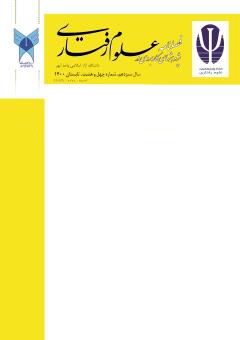بررسی ویژگیهای روانسنجی نسخه فارسی پرسشنامه انگیزش علمی در دانشجویان تحصیلات تکمیلی
محورهای موضوعی : روانشناسی و مشاورهپرویز عسگری 1 , پرستو حسین آبادی 2 , سعید بختیارپور 3
1 - دانشیار، روانشناسی عمومی دانشگاه آزاد واحد اهواز
2 - گروه روانشناسی، واحد اهواز، دانشگاه آزاد اسلامی، اهواز، ایران
3 - گروه روانشناسی، واحد اهواز، دانشگاه آزاد اسلامي، اهواز، ايران
کلید واژه: پرسشنامه انگیزش علمی, اعتباریابی, روایی, پایایی,
چکیده مقاله :
از ﻣﻨﺎﺑﻊ ﻣﻬﻢ ﺷﻨﺎﺧﺖ و آگاهی اﻧﺴﺎن میتوان به پژوﻫﺶ اشاره داشت زیرا زﻣﯿﻨﻪ را ﺑﺮاي ﺗﺮقی در ﺟﺎﻣﻌﻪ ﻓﺮاﻫﻢ میکند. داﻧﺸﻤﻨﺪان ﺑﺮ اﯾﻦ ﺑﺎورﻧﺪ یک پژوﻫﺶ ﺑا دﻗﺖ کافی میتواند ﺑﺎﻋﺚ پیشرفت در ﻫﺮ زﻣﯿﻨﻪاي ﺷﻮد. این پژوهش با هدف بررسی بررسی ویژگیهای روانسنجی نسخه فارسی پرسشنامه انگیزش علمی در دانشجویان تحصیلات تکمیلی صورت گرفت. پژوهش حاضر توصیفی از نوع روانسنجی بود. 301 نفر از دانشجویان به صورت نمونهگیري در دسترس انتخاب شدند. آنها مقیاسهای انگیزش علمی، روحیه پژوهشگری، خودکارآمدی پژوهشی، تنیدگی تحصیلی و هوش معنوی را تکمیل کردند. تحلیل دادهها با استفاده از روشهای آماری، آلفای کرونباخ، تحلیل عاملی تأییدي و روایی واگرا با استفاده از نرم افزارهاي آماری AMOS-25 و SPSS-27 انجام شد. یافتهها نشان داد که مدل پنج عاملی انگیزش علمی برازنده جامعه بود. همچنین، ضریب آلفاي کرونباخ روایی همگرا و واگرا برای کل پرسشنامه و خرده مقیاسهای آن در حد قابل قبول بود. با توجه به روایی و پایایی مناسب این پرسشنامه میتوان از آن براي فعالیتهای پژوهشی و آموزشی در تحقیقات و مراکز آموزشی استفاده کرد.
Research is one of the important sources of human knowledge and awareness because it provides the basis for progress in the society. Scientists believe that a research with sufficient accuracy can lead to progress in any field. This research was conducted with the aim of investigating the validity of the scientific motivation questionnaire in graduate students of medical sciences in Ilam. The present study was a correlational descriptive study. 301 students were selected through convenience sampling. They completed the scales of scientific motivation, research spirit, research self-efficacy, academic stress and spiritual intelligence. Data analysis was done using statistical methods, Cronbach's alpha, confirmatory factor analysis and divergent validity using AMOS-25 and SPSS-27 statistical software. The findings showed that the five-factor model of scientific motivation was suitable for the society. Also, Cronbach's alpha coefficient of convergent and divergent validity for the whole questionnaire and its subscales was acceptable. Considering the appropriate validity and reliability of this questionnaire; it can be used for research and educational activities in research and educational centers.
شیرزاد، زینب؛ مهرام، بهروز و کارشکی، حسین. (1395). ساخت و اعتباریابی مقیاس روحیه پژوهشی برای دانش آموزان دختر مقطع متوسطه شهر مشهد. اندازه گیری تربیتی، 6(23 )، 117-139.
شیروانی، محبوبه؛ سلطانی، امان الله؛ رضوی، ویدا و منظری، علیرضا (۱۴۰۰). طراحی و تبیین مدل ساختاری نقش میانجیگری تنیدگی تحصیلی در رابطه کمالگرایی با سبکهای مقابله با استرس. دوماهنامه علمی- پژوهشی راهبردهای آموزش در علوم پزشکی، ۱۴ (۱) :۴۲-۳۵
قنبری، سیروس و سلطانزاده، وحید (1395). نقش واسطهای هوش هیجانی در ارتباط بین خودکارآمدی پژوهشی و انگیزه پیشرفت تحصیلی (مورد مطالعه: دانشجویان تحصیلات تکمیلی دانشگاه بوعلی سینا همدان). مطالعات اندازه گیری و ارزشیابی آموزشی، 6(14)، 67-41.
گراوند، هوشنگ و پاک مهر، حمیده (1400). ارائة مدل علّی تأثیر جهتگیریهای انگیزشی و فشارآورهای تحصیلی بر خودکارآمدی پژوهشی: نقش واسطهای روحیة پژوهشی. فصلنامه علمی پژوهش در یادگیری آموزشگاهی و مجازی، 9(1)، 102-89.
Amador-Campos, J. A., Peró-Cebollero, M., Feliu-Torruella, M., Pérez-González, A., Cañete-Massé, C., Jarne-Esparcia, A. J., ... & Guàrdia-Olmos, J. (2023). Mentoring and Research Self-Efficacy of Doctoral Students: A Psychometric Approach. Education Sciences, 13(4), 358.
Areepattamannil, S., & Freeman, J. G. (2008). Academic achievement, academic self concept, and academic motivation of immigrant adolescents in the greater Toronto area secondary schools. Journal of Advanced Academics, 19,700–743.
Dekker, S., & Fischer, R. (2008). Cultural differences in academic motivation goals: A meta-analysis across 13 societies. The Journal of Educational Research, 102(2), 99-108.
Duan, C., & Sandhu, K. (2021). Immigrant entrepreneurship motivation–scientific production, field development, thematic antecedents, measurement elements and research agenda. Journal of Enterprising Communities: People and Places in the Global Economy.
Gorson, J., & O'Rourke, E. (2019, July). How do students talk about intelligence? An investigation of motivation, self-efficacy, and mindsets in computer science. In Proceedings of the 2019 ACM Conference on International Computing Education Research (pp. 21-29).
Han, X., Xu, Q., Xiao, J., & Liu, Z. (2023). Academic atmosphere and graduate students’ innovation ability: the role of scientific research self-efficacy and scientific engagement. European Journal of Psychology of Education, 1-18.
Kline, R. B. (1998). Software review: Software programs for structural equation modeling: Amos, EQS, and LISREL. Journal of psychoeducational assessment, 16(4), 343-364.
Shin, D. D., Lee, M., Jung, S. J., & Bong, M. (2023). Relative effects of classroom utility value intervention on the science motivation of girls and boys. Research in Science Education, 53(3), 593-612.
Torres-Toukoumidis, A., Carrera, P., Balcazar, I., & Balcazar, G. (2021). Descriptive study of motivation in gamification experiences from higher education: systematic review of scientific literature. Universal Journal of Educational Research, 9(4), 727-733.
Yang, X., Zhang, M., Kong, L., Wang, Q., & Hong, J. C. (2021). The effects of scientific self-efficacy and cognitive anxiety on science engagement with the “question-observation-doing-explanation” model during school disruption in COVID-19 pandemic. Journal of Science Education and Technology, 30(3), 380-393.You, H. S., Kim, K., Black, K., & Min, K. W. (2018). Assessing science motivation for college students: Validation of the science motivation questionnaire II using the rasch-andrich rating scale model. Eurasia journal of mathematics, science and technology education, 14(4), 1161-1173.


